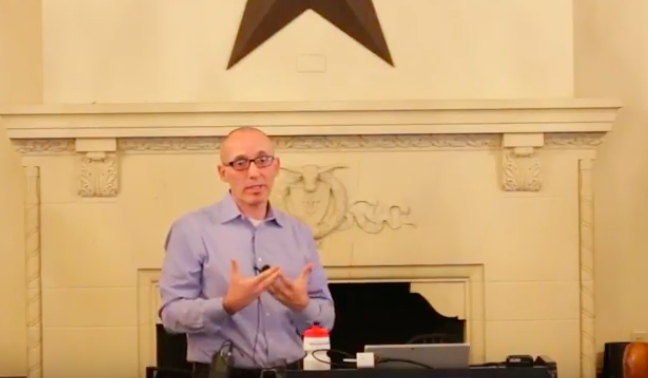As limited funding and job availability looms for those immersed in humanities scholarship, the idea of taking on another set of knowledge proves impossible for many emerging scholars. Because of the large body of knowledge they must acquire within their fields, developing scholars must also work to create legible projects...
Speaker Series Recap: Professor David Rieder
For the DWRL's annual Speaker Series in April 2018, Professor Reider discussed three canons of rhetoric that he developed for the post-PC era of physical computing: transduction, allegorization, and eversion. These canons help his students make projects with microcontrollers and code. Watch the talk here:
Lesson Plan: Soundscape Narration
With audio technology becoming both more advanced and also more affordable, the options for understanding and exploring the ways in which sound and image interact with one another are becoming ever more practically available. Historically, many film directors have been fascinated with the possibilities of different approaches to the use...
Lesson Plan: Genre and Music
In Carolyn Miller's foundational text in Rhetorical Genre Studies, "Genre as Social Action," (1984) she asserts the utility in studying "homely discourses." Examining the quotidian genres we interact with on a daily basis does not "trivialize the study of genres," Miller states, but it actually "take[s] seriously the rhetoric in...
Sounding Images and Imaging Sound
Image and code from wired.com Ferdinand Saussure provided a framework and vocabulary that can be applied in composition classrooms to understand the "arbitrary" nature of representational forms including sound and image. He famously gave us the vocabulary of semiotics including the “signifier" and "signified" within a framework that leaves meaning...
Lesson Plan: Failure Interviews
Image Public Domain, Flickr The goal of this lesson is for students to interview someone who has failed at something—in a small or large, invisible or spectacular way. Typically, when we conduct interviews, we target experts within a field who can dispense some knowledge for our imagined audience. For this...
Lesson Plan: Digital Video Reporting Project (with iMovie and Audacity)
Today's shift towards the vast complexity of digital literacies involves, perhaps more than any other medium, the skills of producing digital videos, including the so-called "fact-based" documentaries and video reports. However, these "facts" are still "made" to fit a rhetorical message with its point of view, narrative structure, and appeals...
Lesson Plan: Using Siri to Teach the Ethics of Digital Labor
The rapid rate by which technology replaces and outdates itself has been measured since 1965 by Moore's Law, which dictates that the amount of transistors within an integrated circuit (microchip) doubles approximately every two years. Gordon Moore, co-founder of Intel, has predicted that the viability of his projection will cease...
Machine as Organism: Technology, Biology, and Collective
The constant increases in technological capacity, prevalence of automation and machine assistance, and the advancement of bio-tech, artificial intelligence, and medical technologies, expedite the tendency to view the issue of human subjectivity through a dichotomy of man/machine. This framing pre-inscribes a frictional relationship between man and machine, as if machines...
Tinkering With Pedagogy: Experimenting With Technology at the DWRL
At the start of last academic year, the Digital Writing and Research Lab assigned two research imperatives: data visualization and wearable technology. While data visualization is ubiquitous in most forms of media, and serves an already established and crucial role in empirical research and its dissemination, the affective affordances of...







